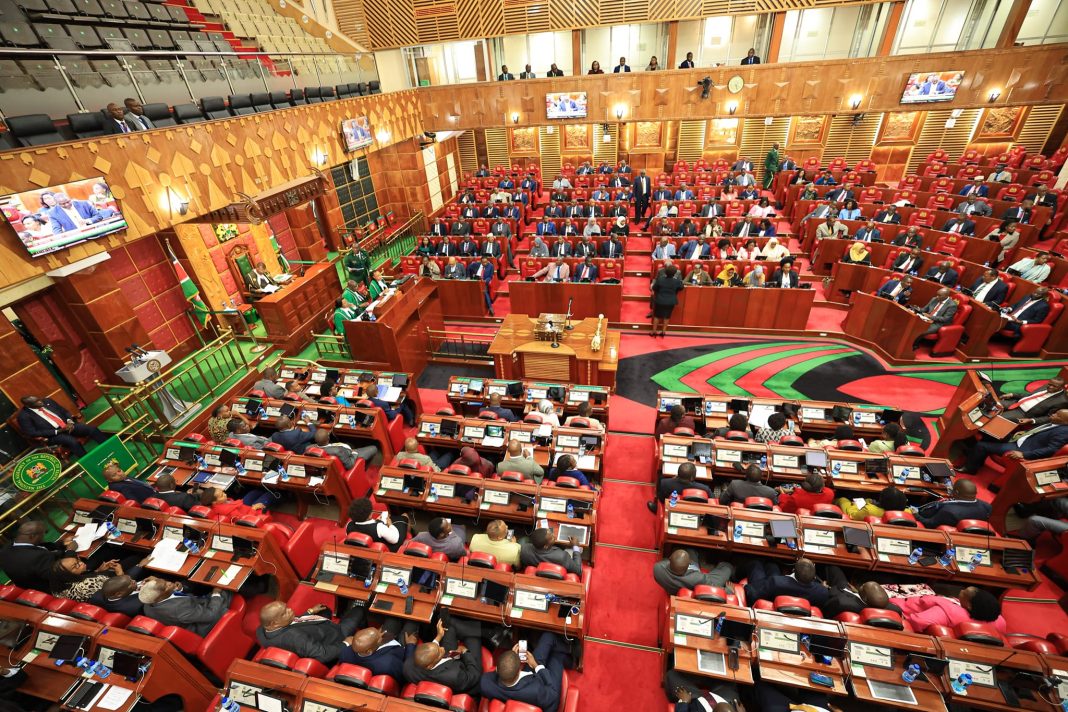Kenya’s National Assembly on Wednesday passed the Finance Bill 2025/26, setting in motion a series of tax and policy reforms for the next fiscal year. The legislation now proceeds to President William Ruto for assent.
The bill introduces wide-ranging measures that aim to streamline taxation, bolster economic growth, and support local enterprise. Treasury Cabinet Secretary John Mbadi presented the proposals, emphasizing their potential to “create a more equitable and growth-driven tax framework.”
One of the most significant changes is the exemption of all gratuity payments from taxation. This provision affects both public and private sector retirees. “This is a victory for our pensioners, who have contributed immensely to the nation,” said Mbadi on the floor of Parliament.
Additionally, the bill expands mortgage relief to include loans used for the construction of homes, not just their purchase or improvement. Businesses also stand to benefit from accelerated deductions on capital expenditure, allowing firms to write off the full cost of operational tools and equipment in the year of acquisition.
However, the bill’s passage followed intense debate. Lawmakers rejected a controversial clause that sought to give the Kenya Revenue Authority (KRA) unrestricted access to taxpayers’ personal financial information. Civil society groups and legal experts had decried the proposal as unconstitutional and intrusive. “We will not allow laws that violate Article 31 of the Constitution,” declared Suba North MP Millie Odhiambo during the debate.
Parliament also struck down a proposed KSh5 million account monitoring threshold, raising questions over the KRA’s ability to curb tax evasion without infringing on personal privacy.
In terms of revenue, Treasury projects the bill will generate approximately KSh24 billion, lower than collections expected from previous finance bills. This cautious estimate appears to reflect growing public opposition to tax-heavy policies seen in recent years.
The national budget for 2025/26, totaling KSh4.29 trillion, allocates a record KSh702.7 billion to education while reducing spending on agriculture and food security programs. Treasury has outlined a funding plan composed of ordinary revenue, grants, and external borrowing.
As the bill heads to the President’s desk, attention now turns to its implementation and the government’s ability to balance fiscal discipline with public interest.







888slot nổi tiếng với dịch vụ cá cược thể thao đa dạng, bao gồm các môn thể thao phổ biến như bóng đá, bóng rổ, tennis, đua ngựa và nhiều giải đấu lớn trên toàn cầu. Người chơi có thể tham gia đặt cược trực tiếp, với tỷ lệ cược luôn được cập nhật liên tục, đảm bảo sự minh bạch công bằng. Không chỉ vậy, nơi này còn cung cấp nhiều loại kèo khác nhau, từ kèo châu Âu, kèo châu Á, kèo tài xỉu cho đến kèo phạt góc, kèo hiệp phụ nhiều hình thức cược khác, đáp ứng đầy đủ nhu cầu của khách hàng.
888slot nổi tiếng với dịch vụ cá cược thể thao đa dạng, bao gồm các môn thể thao phổ biến như bóng đá, bóng rổ, tennis, đua ngựa và nhiều giải đấu lớn trên toàn cầu. Người chơi có thể tham gia đặt cược trực tiếp, với tỷ lệ cược luôn được cập nhật liên tục, đảm bảo sự minh bạch công bằng. Không chỉ vậy, nơi này còn cung cấp nhiều loại kèo khác nhau, từ kèo châu Âu, kèo châu Á, kèo tài xỉu cho đến kèo phạt góc, kèo hiệp phụ nhiều hình thức cược khác, đáp ứng đầy đủ nhu cầu của khách hàng.
888slot nổi tiếng với dịch vụ cá cược thể thao đa dạng, bao gồm các môn thể thao phổ biến như bóng đá, bóng rổ, tennis, đua ngựa và nhiều giải đấu lớn trên toàn cầu. Người chơi có thể tham gia đặt cược trực tiếp, với tỷ lệ cược luôn được cập nhật liên tục, đảm bảo sự minh bạch công bằng. Không chỉ vậy, nơi này còn cung cấp nhiều loại kèo khác nhau, từ kèo châu Âu, kèo châu Á, kèo tài xỉu cho đến kèo phạt góc, kèo hiệp phụ nhiều hình thức cược khác, đáp ứng đầy đủ nhu cầu của khách hàng.